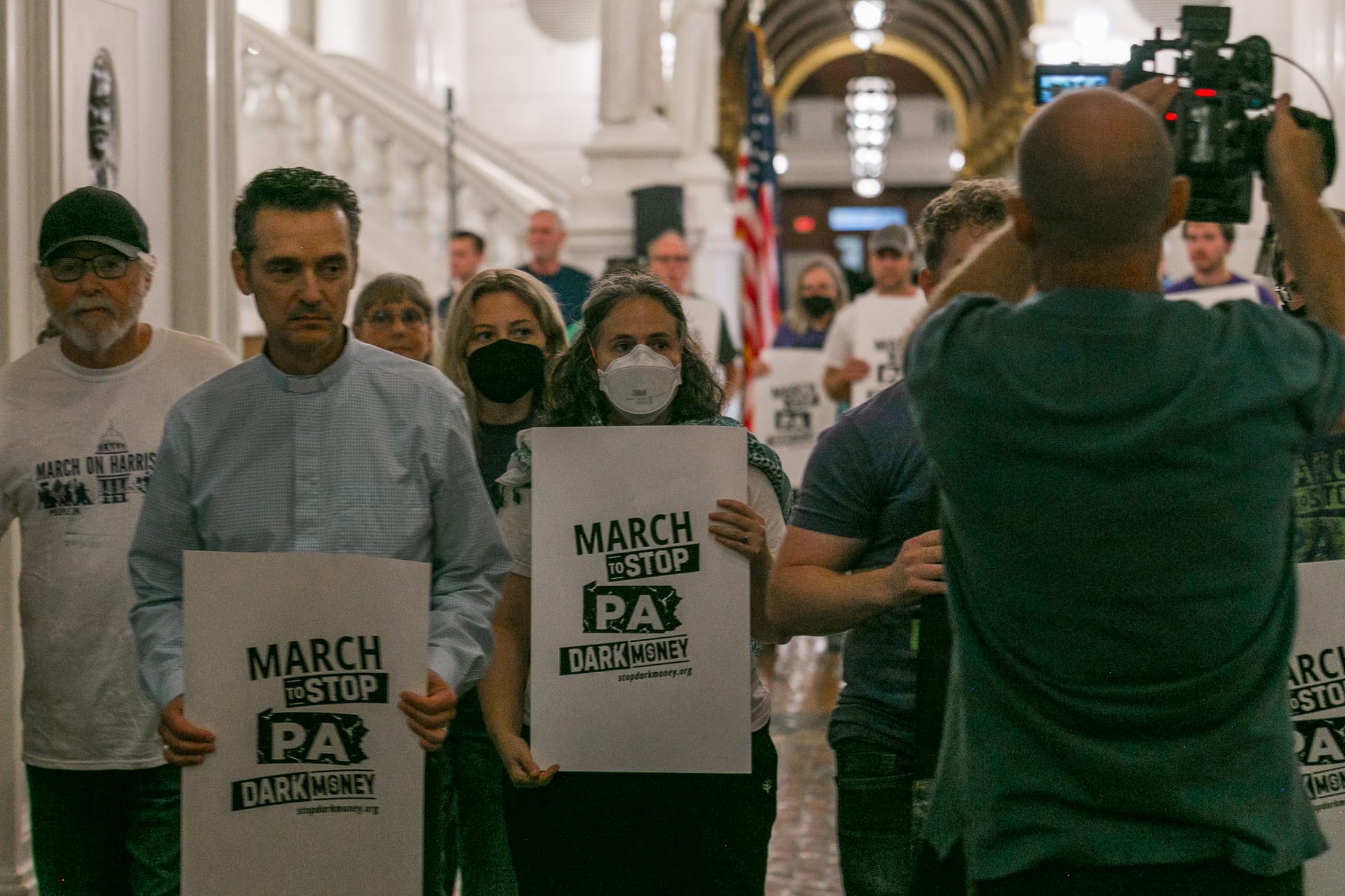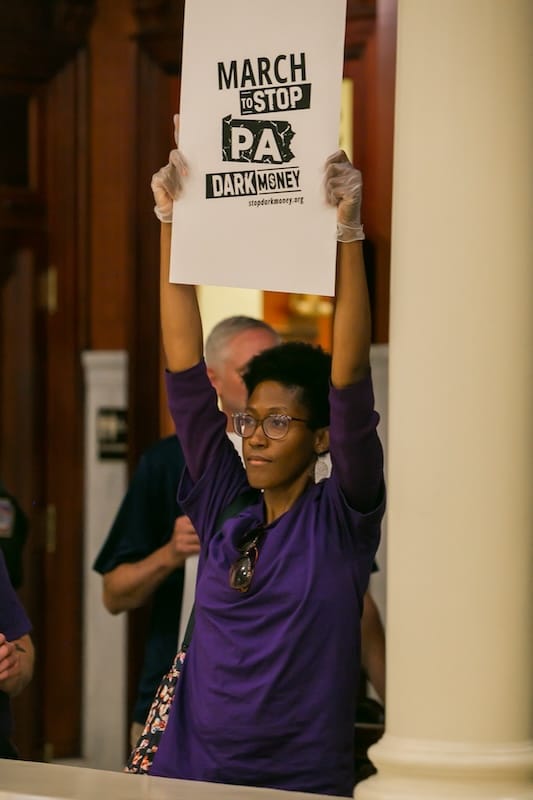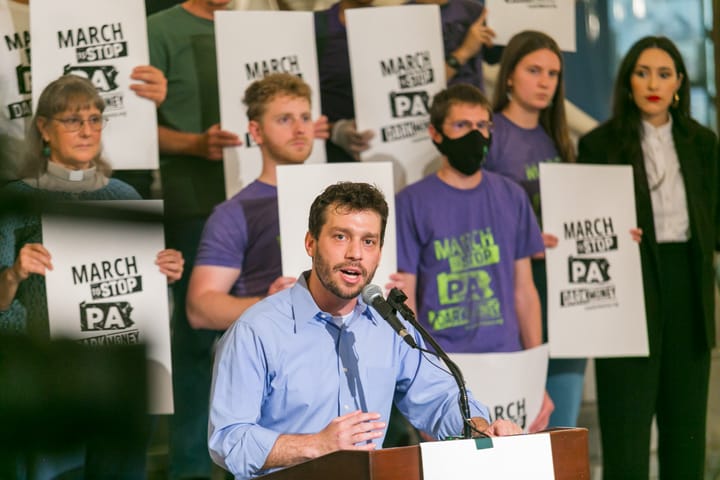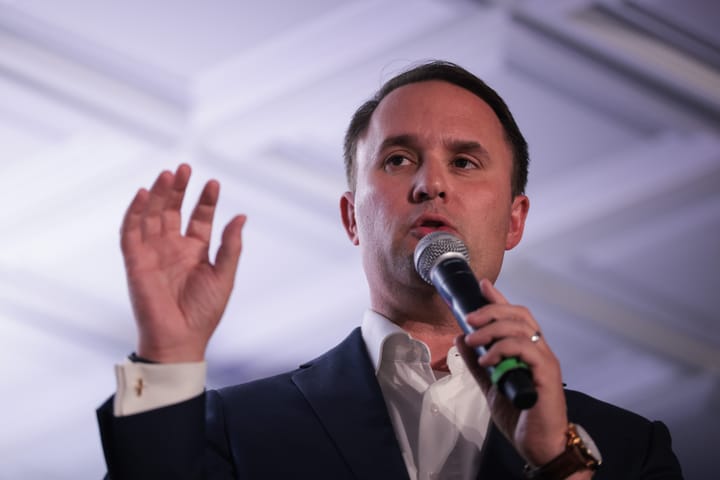Activists from the nonpartisan pro-democracy group MarchOnHarrisburg said that Pennsylvania Senate President Kim Ward was refusing to meet with them to discuss one of their legislative priorities, a bill to ban spending by foreign-influenced corporations in politics, so last week they marched to the state capitol to demand a meeting with her.
The activists walked from Lancaster to Harrisburg, a 35-mile trek, and held a rally at the Pennsylvania State Capitol, where they were joined by allies like the Pennsylvania Poor People’s Campaign. After the rally, the activists walked to the office of Sen. Ward, a Republican, and were allowed in, for what they called a productive meeting with the senator’s staffers.
The bill they were there to promote, HB 2433, would ban spending by foreign-influenced corporations in state politics. Supporters of the measure say it would close a loophole that can be used by foreign interests to influence Pennsylvania’s elections. The bill was passed by the Pennsylvania House on July 1 in a bipartisan 126-76 vote, with the support of 24 Republicans, but it has not been called up for a vote in the state Senate, where Republicans hold a 28-22 seat majority over Democrats.
HB 2433 would ban foreign-influenced corporations from making expenditures to defeat or support candidates, ballot measures, or nominations, as well as from donating to political parties. It also prohibits them from making a donation to any person “with the express or implied condition” that the money would be used for any of the purposes prohibited by the bill. The bill defines foreign-influenced corporations as those where a single foreign investor owns or controls 1% or more of equity, multiple foreign investors collectively own or control 5% or more of equity, or where any foreign investor participates directly or indirectly in the corporations’ decision-making over U.S. political activities.
Rabbi Michael Pollack, executive director of MarchOnHarrisburg (MoH), told Sludge before setting out on the march, “We expect Senate President Kim Ward to do the right thing and combat foreign interference in our elections through unlimited multinational corporate spending and pass House Bill 2433. The bill already passed through the House in a bipartisan vote, and it’s the Senate’s turn to act.
“We can’t have a functional democracy so long as unlimited multinational corporate cash is swirling through it pushing interests that are not the interests of the people of Pennsylvania,” said Pollack.

Erica Clayton Wright, spokesperson for Ward, told Sludge after the Sept. 16 meeting with MoH members, “Special interest advocates such as March on Harrisburg are always welcome in our office to lobby their cause.”
The three-day march featured stops in Lancaster, Elizabethtown, Mt. Joy, and Steelton, before culminating in the event in Harrisburg, where group members were prepared to engage in nonviolent civil disobedience to draw attention to their cause. MoH said in a press release its efforts to reach Ward for a meeting on HB 2433 included in-district billboarding and flyering. In past years, MoH members have held peaceful protests at Capitol offices, and agreed to be arrested, while calling for ethics reform legislation like a ban on gifts given by lobbyists to state lawmakers.
“When we march, it’s a moving convention,” Pollack said. “We walk and talk with each other, and build up the movement for democracy in Pennsylvania. We raise pressure on key legislators to act on our legislation.”
The bill’s lead sponsor, Democratic state Rep. Joe Webster, told Sludge, "I introduced HB 2433 because the only people who should be deciding Pennsylvania's elections should be Pennsylvanians. It passed in the House with bipartisan support in July because my colleagues on both sides of the aisle understand that. Corporations with a substantial percentage of foreign ownership should not have a path to financially influence the success or defeat of a candidate or ballot question in Pennsylvania. It's a matter of election integrity and fairness, with voting power remaining with the people."
No one and nothing should influence the outcome of PA's elections except Pennsylvania voters. My bill, HB 2433, is now one step closer to prohibiting foreign-owned corporations from contributing to political campaigns for good.#PAHouse #PALegislation pic.twitter.com/5u78oCpT2t
— Rep. Joe Webster (@RepJoeWebster) July 2, 2024
Fewer than 1% of firms are multinational enterprises, according to Census data covering 1997-2017, but these firms are the economic giants, responsible for 40% of U.S. sales.
According to the Center for American Progress (CAP), legislation like HB 2433 would cover 98% of the Fortune 500, thereby helping to curb the risk of foreign money flowing into elections through “dark money” groups. In a 2020 report on foreign-influenced corporate spending, CAP found: “Shell companies often can be organized as an LLC with little more than an opaque, nondescriptive name—that gives no clue as to its true owners—and a post office box address, which hides whether the owner is a foreign entity.”
The legislation would exclude nonprofits and unions, as not-for-profit organizations, from the prohibition against taking donations from foreign-influenced companies.
As an example of how foreign-influenced companies have funneled money into elections, MoH points to the case of Uber, DoorDash, and other gig economy companies promoting California’s 2020 ballot measure, Proposition 22, which classified workers as independent contractors instead of employees. The ballot measure was passed by California voters with 58.6% in favor after supporters’ spending swamped that of opponents, with Uber leading in donations to groups backing the measure. The rideshare company received billions in investment from Saudi Arabia’s sovereign wealth fund.
Pennsylvania’s campaign finance laws are lax compared with other states—the Commonwealth is one of under a dozen states with no contribution limits for individual donors, state parties, or PACs, according to a survey from the National Conference of State Legislatures. (Some of the others include Oregon, Texas, Utah, and Virginia.) In 2022, large donations to candidates fueled Pennsylvania's most expensive governor’s race ever recorded.
In Pennsylvania, polls show that campaign finance reform is broadly popular. An August 2023 poll by Franklin & Marshall College found that 77% of Pennsylvanians strongly agree that money in politics is a threat to democracy. Nationwide, a poll released in July by the progressive Data for Progress found that 82% of likely voters say there should be limits on election spending by foreign-owned corporations.
“It's no secret that faith in our government and our democracy is at an all time low,” Andrea Paulic, lead organizer with MoH, told Sludge. “Across the country, companies with significant foreign ownership, like Amazon, Shell, and Uber, have used their money to influence the outcome of elections and political agendas in their favor. The goals of large multinational corporations and investors are in direct conflict with our political goals and basic needs as Pennsylvanians.
“HB 2433 is a groundbreaking pro-democracy bill that ensures Pennnsylvania's ability to self-govern, and would restore confidence that our democracy is of, by, and for the people of Pennsylvania,” Paulic said.
Versions of the legislation have become law in several states and cities, and have been introduced in more than a half dozen other areas. In January 2020, the city of Seattle, Washington passed a similar measure, after a version was passed in St. Petersburg, Florida in 2017. In Seattle, the City Council voted unanimously, 7-0, for the measure, after Amazon threw its weight around in city elections the year before, including by giving $1 million to a PAC helmed by the Seattle Metropolitan Chamber of Commerce.
In April 2023, Minnesota became the first state to pass a ban on election spending by foreign-influence corporations, as part of the sweeping Democracy for the People Act that also enacted election reforms and increased transparency in political spending. Later last year, in November, voters in Maine overwhelmingly passed a version of the law as a ballot initiative. In January, the City Council in San Jose, California voted unanimously for a ban, and the nonprofit that helped draft the legislation, Free Speech For People, is tracking versions in California, New York, Washington State, and other areas.
A version of the bill, titled the Get Foreign Money Out of U.S. Elections Act, was reintroduced in July in the U.S. Congress by Rep. Jamie Raskin (D-Md.) and has 31 Democratic co-sponsors.
After the initial meeting last week, Pollack said in a statement, “We look forward to hopefully moving HB 2433 forward together with Senate President Kim Ward. No commitments have been made to pass the bill, but we have committed to each other to continue talking through the issue. It took a lot to get to the table, and we hope that these discussions will eventually lead to the imminent passage of this necessary legislation that Pennsylvanians have long demanded and deserved.”

Wright, spokesperson for the Senate president, said, “We look forward to our continued conversations with March on Harrisburg and expect to have a meeting with their legal team to better understand the content of the Free Speech for People bill that they are working to advance.”
At the Capitol rally on Monday, members of the Pennsylvania Poor People’s Campaign joined MoH to build pressure on advancing other bills in the group’s agenda, including HB 180 / SB 180, to cancel student lunch debt, and SB 955, to restore an adult dental benefit to Medicaid.
The MoH marchers’ announcement also mentioned some campaign finance reform bills in the group’s policy platform that they hoped would see new activity in the state General Assembly. One bill, HB 1472, would increase transparency in political spending by requiring disclosures from all groups spending more than $500 on elections, including nonprofits like 501(c)4 “dark money” organizations that are allowed to hide their funding sources from the public. Another is the group’s long-running priority of a gift ban of anything valued over $10 to public officials, employees, and members of their close family, a measure that would close the state’s loophole-ridden rules that allow lobbyists to bestow luxury vacations and expensive gifts on lawmakers without monetary limit.
Pollack said, of the foreign-influenced corporation spending ban, “This is an extremely popular bill with the public—nobody outside of the State Capitol building wants to see more multinational corporate dark money swirling through our political system. People are upset and tired of unlimited ads and mailers coming at them from all directions, fueled by interests that are at odds with the interests of Pennsylvania.”




